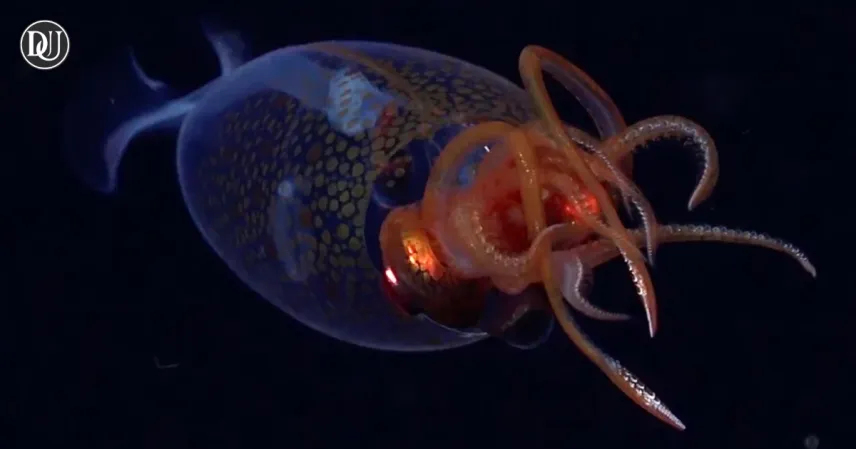In an extraordinary breakthrough, scientists have captured the first-ever footage of a live colossal squid in its natural deep-sea habitat. This exciting discovery took place near the South Sandwich Islands in the South Atlantic Ocean, offering a rare and captivating glimpse into the life of one of the ocean’s most mysterious and elusive creatures.
🌊 A Glimpse into the Abyss
The juvenile colossal squid, about 30 cm (12 inches) long, was filmed by a remotely operated vehicle known as SuBastian at a depth of around 600 meters (1,968 feet). This sighting offers a glimpse into a world that, until now, had been largely unknown to scientists. Watching the squid move in its natural environment is nothing short of mesmerizing, opening doors to understanding a creature that has long been shrouded in mystery.
🧬 Why This Discovery Matters
The colossal squid, also known as Mesonychoteuthis hamiltoni, is the heaviest invertebrate on the planet. It can grow up to an astounding 7 meters (23 feet) in length and weigh over half a ton. While these creatures have been observed in the stomachs of whales and seabirds or found entangled in fishing nets, seeing one live in its natural environment is a rare privilege. This footage provides a once-in-a-lifetime opportunity to study its behavior, biology, and how it survives in such extreme conditions.
🎉 A Century of Discovery
Coincidentally, this discovery marks the 100th anniversary of the formal identification of the colossal squid. This milestone is a fitting tribute to a century of marine research. The expedition was a collaborative effort between international scientists and researchers aboard the Falkor, a research vessel from the Schmidt Ocean Institute. Their efforts highlight the importance of global cooperation in unlocking the mysteries of our oceans.
📺 Watch the Discovery
For those eager to see this fascinating creature, the footage of the colossal squid is available for viewing. It’s a breathtaking reminder of the deep, unexplored world beneath the surface, filled with creatures as incredible as the squid.
🌍 A Step Forward in Ocean Exploration
This discovery doesn’t just deepen our knowledge of marine life; it also underscores the need for continued exploration and conservation of our oceans. There’s so much more to discover, and this is just the beginning. As technology advances, we’ll undoubtedly uncover more secrets from the deep that can help protect and preserve these vital ecosystems.
This breakthrough is a testament to the importance of pushing boundaries in scientific research. The deep sea remains one of the least explored frontiers on Earth, and this discovery brings us one step closer to understanding the vast and mysterious life that thrives beneath the waves.
Let’s continue to support and celebrate such groundbreaking discoveries—they remind us that the wonders of our planet are still waiting to be uncovered.










